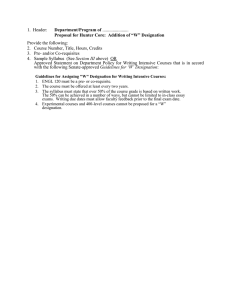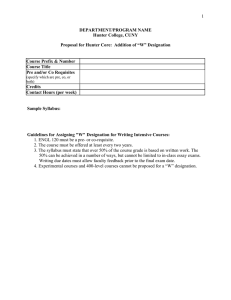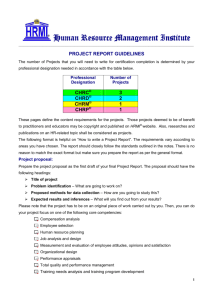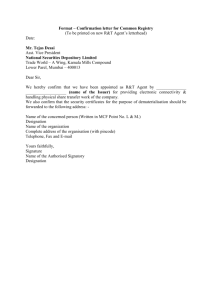URSICA guidelines.docx
advertisement
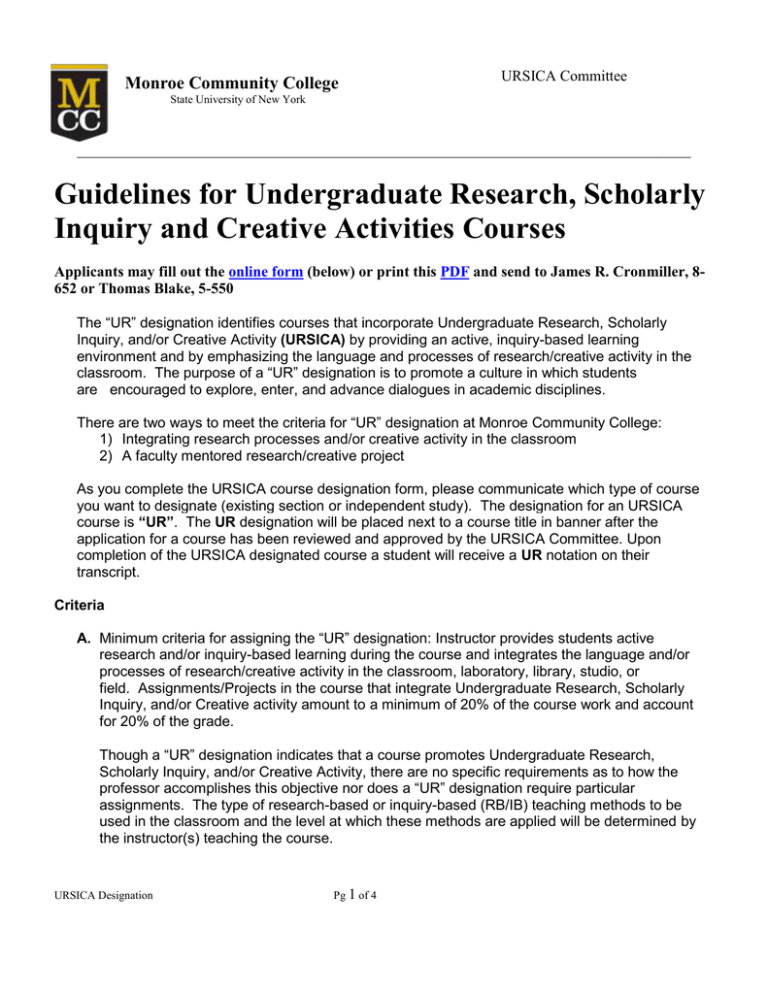
Monroe Community College URSICA Committee State University of New York _________________________________________________________________________________________ Guidelines for Undergraduate Research, Scholarly Inquiry and Creative Activities Courses Applicants may fill out the online form (below) or print this PDF and send to James R. Cronmiller, 8652 or Thomas Blake, 5-550 The “UR” designation identifies courses that incorporate Undergraduate Research, Scholarly Inquiry, and/or Creative Activity (URSICA) by providing an active, inquiry-based learning environment and by emphasizing the language and processes of research/creative activity in the classroom. The purpose of a “UR” designation is to promote a culture in which students are encouraged to explore, enter, and advance dialogues in academic disciplines. There are two ways to meet the criteria for “UR” designation at Monroe Community College: 1) Integrating research processes and/or creative activity in the classroom 2) A faculty mentored research/creative project As you complete the URSICA course designation form, please communicate which type of course you want to designate (existing section or independent study). The designation for an URSICA course is “UR”. The UR designation will be placed next to a course title in banner after the application for a course has been reviewed and approved by the URSICA Committee. Upon completion of the URSICA designated course a student will receive a UR notation on their transcript. Criteria A. Minimum criteria for assigning the “UR” designation: Instructor provides students active research and/or inquiry-based learning during the course and integrates the language and/or processes of research/creative activity in the classroom, laboratory, library, studio, or field. Assignments/Projects in the course that integrate Undergraduate Research, Scholarly Inquiry, and/or Creative activity amount to a minimum of 20% of the course work and account for 20% of the grade. Though a “UR” designation indicates that a course promotes Undergraduate Research, Scholarly Inquiry, and/or Creative Activity, there are no specific requirements as to how the professor accomplishes this objective nor does a “UR” designation require particular assignments. The type of research-based or inquiry-based (RB/IB) teaching methods to be used in the classroom and the level at which these methods are applied will be determined by the instructor(s) teaching the course. URSICA Designation Pg 1 of 4 Ultimately, the “UR” indicates that the course stresses the foundations, processes, and/or language of research/creative activity to prepare students to better understand, evaluate, and advance concepts pertaining to a particular field. A “UR” designated course emphasizes active learning and stresses analysis, synthesis, and evaluation. Examples of Student Assessments and Assignments may include 1) Lab Reports 2) Small-Group Discussions 3) Research Projects 4) Critical Reviews 5) Conducting/Evaluating Interviews 6) Mathematical Thinking 7) Essay 8) Portfolio 9) Presentation Course Goals may include requiring students to illustrate 1) Collaboration 2) Critical Thinking 3) Respect for Diverse Perspectives 4) Awareness of Global Issues 5) Metacognition 6) Scientific Literacy Undergraduate Research may include 1) Explicit instruction/discussion of research methods and practices a. Navigating Databases and other Search Tools b. Evaluating Sources c. Scientific Processes/Experimental Design d. Appropriate Citation (MLA, APA, Chicago, ASA, etc.) e. Integrating Sources f. Theoretical/Practical Applications of Processes/Concepts 2) Source-based writing assignments a. Mini-papers/Projects (require use of outside sources: web, journal, news, etc.) b. Analysis/Application/Presentation of peer-reviewed journal c. Presentation/Analysis/Discussion of data-sets or experiments d. Lab with writing component (discussion of conclusion, relevance, application, etc.) e. Annotated Bibliography f. Formal Research Paper or Project URSICA Designation Pg 2 of 4 Scholarly Inquiry may include 1) Facilitating/Leading discussion, asking open-ended questions, and/or promoting student interaction. 2) Emphasizing “how we come to know” in environment in which students construct knowledge through collective engagement and active involvement. 3) Encouraging students to understand why information is important and urges students to recognize the cultural, political, economic, professional, scientific, and/or ethical relevance of material. 4) Focusing on higher levels of Bloom’s Taxonomy including understanding, application, analysis, synthesis and evaluation. 5) Some inquiry-based teaching methods include: a. Analysis and Evaluation b. Case Studies c. Inquiry Laboratory d. Metacognition/Reflection e. Problem-Based learning f. Role Playing by Students g. Socratic Method h. Theme-Based Course Design Creative Activity may include 1) Assignments/Class Activities that generate creative expression a. Brainstorming b. Group Composition c. Image Flooding/Image Prompts d. Experimentation with varying Techniques/Media e. Journaling f. Peer Review g. Stream of Consciousness h. Observation 2) A Final Project a. Composition b. Performance c. Portfolio d. Presentation 3) Guidance on professional activity a. Communicating Effectively with/in Gallery, Publication, or Theater b. Marketing/Presenting/Selling/Performing Work c. Publishing d. Utilizing Technology of Field URSICA Designation Pg 3 of 4 B. Minimum criteria for assigning a course URSICA based on Faculty Mentored Undergraduate Research: An Independent study offers a student the opportunity to engage in research/creative activity while working closely with a faculty mentor. It should be made clear to the student that the research/creative project must be showcased publicly in some way (e.g., publication, performance, exhibit, presentation, etc.) To be designated “UR,” a Faculty Mentored Research course must fulfill all of the following guidelines: 1) The research engages students in a research project, either contributing to a faculty research project or an independent study. 2) Students conduct ongoing research and work an average of 3 hours per week. 3) Students extend/refine knowledge of discipline-specific language, research ethics, skills in research methodologies, and existing scholarship in the field. 4) The learning objectives related to the research experiences are clearly articulated related to their field of study, education goals and /or career and vocation. 5) There is supervision and feedback by a mentor who has expertise related to their field of study, education goals and/or career and vocational aspirations. 6) The syllabus includes a reflection assignment and a final synthesis project integrated into the course. 7) There is an outlet to disseminate the research such as class presentation, performance, exposition, symposium, conference, or scholarly paper integrated into the course. URSICA Designation Pg 4 of 4

